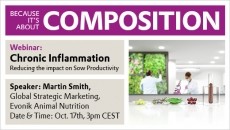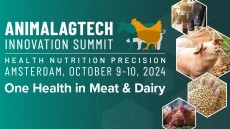Investors back French insect feed start-up to the tune of €1.3m

The company was officially set up in October 2015. It harvests Black Soldier Fly larvae, which it processes into meal and oil for aquaculture, livestock and pet food, as well as agricultural fertilizer.
The start-up has attracted funds from the likes of Silicon Valley business angel, Jerome Lecat, Khaled Helioui, the couple behind Atelier Cologne: Sylvie Ganter and Christophe Cervasel, as well as crowdfunding equity platforms, Anaxago and Angelsquare, and others.
“We secured the investment in December 2016. We chose to target business angels and crowdfunding initiatives. We also got backing from [early stage investor firm], Kima Ventures.
“A huge help in understanding how to go about all of this was French business angel, Cyril Grislain, who is also a nextProtein board member,” co-founders Syrine Chaalala and Mohamed Gastli, told FeedNavigator.
The co-founders said the green light given to insect meal use in fish feed in the EU by the SCoPAFF committee in December 2016 should make subsequent fund raising easier. “Some investors we spoke to asked us to get back in touch with them once the EU regulation is in place,” said Gastli.
'Competitively' priced product
CEO Gastili, who has a background in chemical engineering, said that insect meal production is seen as a high volume, commodity business but nextProtein’s manufacturing model can generate insect protein and oil at a competitive price – a key factor in securing funds from investors.
The R&D and sales side of nextProtein operates out of France, but production takes place through a subsidiary in Tunisia - a location that enables low cost manufacturing, particularly on the energy input side but also in terms of sourcing of readily available and inexpensive plant substrates, he said.
“We have been able to re-assure our investors of our capacity to produce to strict EU quality standards,” said Chaalala, who previously worked with the UN’s Food and Agriculture Organization (FAO).
In fact, Chaalala and Gastili are actively involved in a project documenting best practice in quality and hygienic insect meal production with other members of the International Platform of Insects for Food and Feed (IPIFF). “This is being done collaboratively with other insect meal producers. We had our first workshop yesterday, with the publication set to be finalized by the end of 2017."
Tonnage targets
After achieving the 2016 daily milestone of producing 30kg of insect larvae from 300kg of fruit and vegetable waste, the co-founders said the objective for 2017 is the conversion of between five and 10 tons of organic waste into one ton combined of protein and oil [70:30 ratio] per day from its new 2500m2 production site.
The Tunisian facility will also allow nextProtein to target African based pig and poultry meat producers as there is no legislation prohibiting the use of insect meal in that geography, said the co-founders.
“We hope to be producing annually around 5,000 tons of protein and oil combined within five years’ time, and we plan to open new facilities in Africa and Asia during that period,” said the co-founders.




















